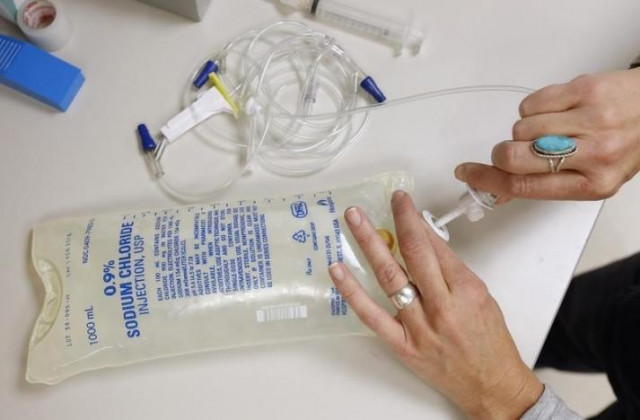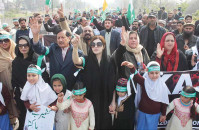Health budget gets 25% boost
Increases in paramedical staff, immunisation funding across province

A nurse prepares a bag of saline. PHOTO: REUTERS
In his budget speech on Monday, Shah called health a priority sector and said that the government of Sindh has expanded the resource allocation in the sector to keep it the third largest sector in terms of budget outlay.
The Annual Development Programme for health-related initiatives stands at Rs15.5 billion for the upcoming fiscal year, compared to Rs14billion for 2016-17. The Sindh Immunisation Support Programme has been allocated Rs8.09 billion ‘to revolutionise the inoculation process and make future generations healthier’, he said, adding that, “Vaccines are the most effective health intervention in terms of economics as they lower the cost of healthcare required in the future”.
Punjab unveils Rs1.97 trillion development-centric budget
The allocation for medicine has been increased to Rs7.9 billion in the upcoming fiscal year, with Rs2 billion allocated for surgical instruments, oxygen gas, consumables, x-ray film, and dietary costs of patients.
Meanwhile, the allocations for repair and maintenance of machinery, equipment and ambulances has been enhanced to Rs1.14 billion, with the creation of 25,000 new posts at different levels of health management in the province allocated Rs7.7 billion, including Rs6.5 billion for the Lady Health Worker (LHW) Programme, with the deployment of more than 2,100 LHWs.
The budget for the National Institute of Cardiovascular Disease (NICVD) has been enhanced from Rs1.8 billion to Rs5.8billion, including Rs4 billion for NICVD in Karachi.
Furthermore, the grant for the Sindh Institute of Urology and Transplantation, Karachi has been increased from Rs4 billion to Rs4.5 billion and the grant for the Indus Hospital, Karachi has been doubled from Rs500 million to Rs1 billion.
Water, sanitation given due attention in budget
Rs690.14 million has been allocated for strengthening and expanding the Extended Programme for Immunisation, with 2,118 additional posts created for vaccinators.
Automation of the heath department has been allocated Rs280 million and a hospital waste management programme will be launched in all major hospitals of the province with a budget of Rs75 million.
“550,000 school-going children, 400,000 people from the general population, 75,000 from the high-risk population and high-risk groups, 25,000 jail inmates, and 2500 haemophilic patients will be vaccinated against Hepatitis B in the upcoming year, Shah said.
A total of 107 schemes have been allocated funds. Most them are ongoing initiatives from the 2016-17 budget, with 20 initiatives marked for teaching hospitals at a cost of Rs2.84 billion, another Rs6.63 billion for other hospitals and Rs1.31 billion for medical education. Furthermore, the primary healthcare administration has been allocated Rs400 million, with Rs196.88 million marked for the provincial nutrition programme. The preventive medicine programme in the province has been allocated Rs4.01 billion and Rs101.75 million has been marked for programmes receiving foreign aid.
Budget 2017-18: Much still needs to be done, says finance minister
One of the handful of new initiatives – Makhdoom Muhammad Zaman Talibul Mola Medical College and Teaching Hospital – has been allocated Rs47.5 million against a total estimated cost of Rs4 billion.



















COMMENTS
Comments are moderated and generally will be posted if they are on-topic and not abusive.
For more information, please see our Comments FAQ